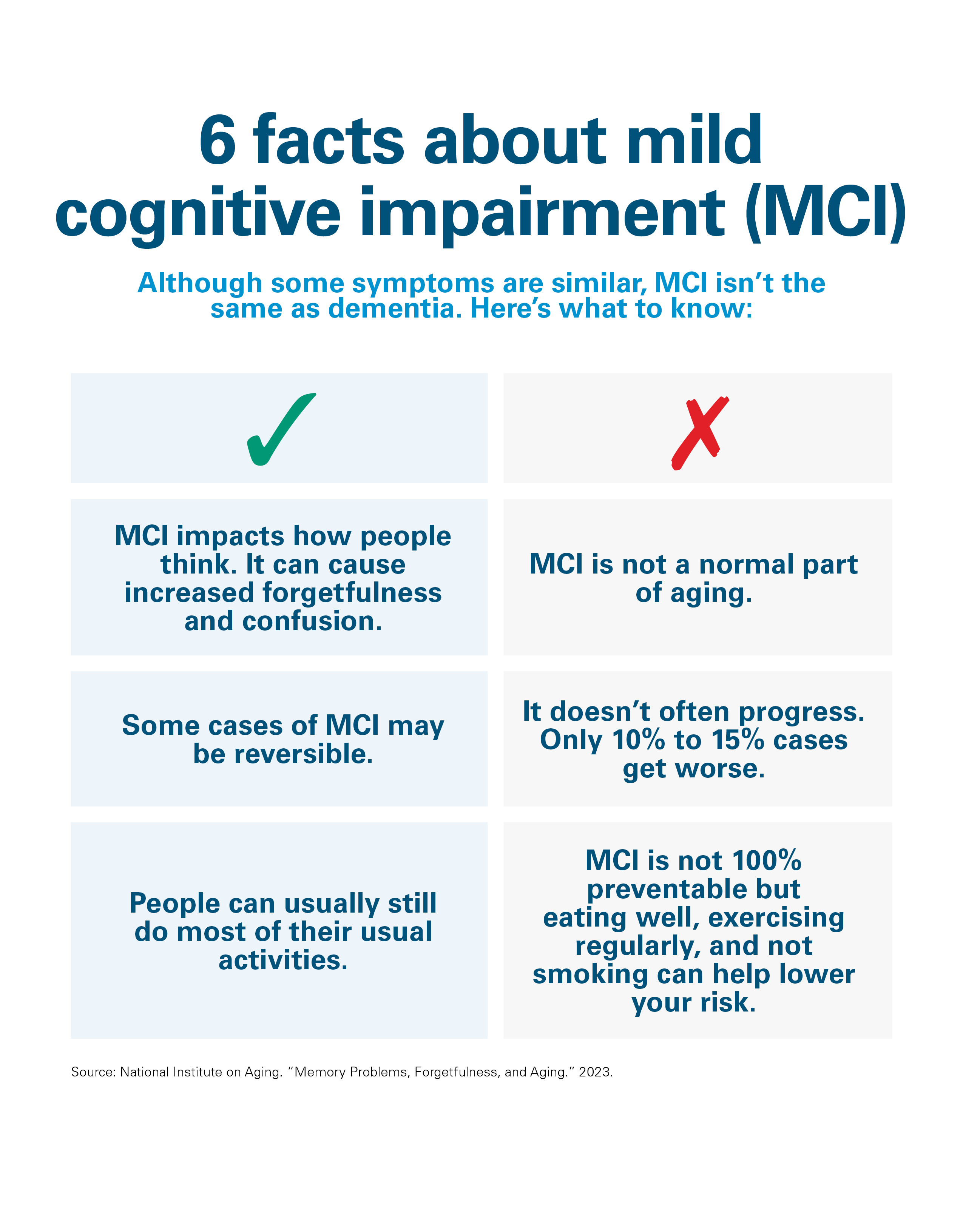What mild cognitive impairment (MCI) looks like in older adults — and how to help
MCI isn't as severe as dementia, but it can still cause memory and thinking issues. Here's how to spot MCI in an older loved one and help them manage it.

It’s not unusual to forget things now and again as you age. But some older adults have more significant memory loss and thinking problems than others. It’s a condition called mild cognitive impairment (MCI). While it’s not as severe as dementia (people with MCI can still care for themselves), MCI is also marked by issues with memory and thinking skills.
Although the National Institute on Aging (NIA) estimates that between 10 and 20 percent of adults ages 65 and older will develop MCI over a one-year period, the condition is not a normal part of aging.
If you notice memory or thinking changes in an older loved one, they may have MCI. Here’s what you need to know to help them manage it.
Join IBX for one of our Weekday Wellness events! These free, virtual events are open to the public. Register now to secure your spot. This is an educational event. For accommodations of persons with special needs at meetings, call 1-877-393-6733 (TTY/TDD: 711).
What are the symptoms of MCI in older adults?
Losing an item from time to time is a normal part of healthy aging, according to the NIA. But people with MCI may lose things more often. They may also forget to go to important appointments or have more trouble coming up with words than people of the same age. What’s more, movement difficulties and changes in your sense of smell have also been linked to MCI.
A person with MCI may lose their train of thought often or struggle to follow the plot of a book or movie. They may find it hard to make decisions, follow instructions, find their way around places they once knew well, or start to show worse judgment. These changes may be noticeable to friends and family. People with MCI may also experience depression, anxiety, a short temper, or apathy.
What causes MCI?
Age is the primary risk factor for MCI. In other words, the chances of developing MCI increase as a person gets older. But there is no single cause of MCI, according to the NIA.
Some of the brain changes that can happen to people with Alzheimer’s disease or other forms of dementia are also seen in people with MCI, according to Mayo Clinic. Traumatic brain injuries can also result in MCI.
Certain genetic factors can put someone at higher risk of developing MCI, as can having certain health conditions such as:
- Depression
- Diabetes
- High blood pressure
- High cholesterol
- Obesity
- Obstructive sleep apnea
Certain lifestyle factors have also been linked to MCI, including:
- Lack of exercise
- Lack of mentally or socially stimulating activities
- Low education level
- Smoking cigarettes
If my loved one has MCI, does that mean they will develop dementia?
Not necessarily. In people ages 65 and older, MCI progresses into dementia about 10 to 15 percent of the time. There is no surefire way to prevent the onset of MCI, but certain lifestyle changes may help lower your risk.
How can I help an older loved one living with MCI?
MCI can leave your loved one feeling frustrated, and you feeling helpless. Luckily, there are steps caregivers can take to improve their loved one’s quality of life and even their memory.
Keep their mind stimulated.
Just because your loved one is getting older doesn’t mean they have to stop learning. Picking up a new skill is a great way to keep the mind sharp. Suggest they try a new hobby, such as learning how to knit or play chess.
You could also set aside time to play brain-boosting games together. Researchers from a small study published in the International Journal of Environmental Research and Public Health in 2022 asked older adults with MCI to play an interactive memory video game once a week. After 12 weeks, participants who played the memory game had higher scores on a mental state questionnaire, compared with older adults who didn’t play.
Find out which memory tools work for them.
To-do lists, organizational smartphone apps, handwritten notes, and calendars can help your loved one remember important details and events. You can encourage them to add one (or multiple) of these tools to their routine — and help them remember to use them, at least until the habit sticks.
Encourage them to stay social.
Spending time with friends and family can help preserve your loved one’s memory and thinking skills. They can also make new social connections by volunteering in their community.
Help them develop healthy habits.
Taking care of your body and mind can help keep MCI from progressing. According to the NIA, these strategies may help your loved one feel better:
- Have a nutritious diet. There are lots of ways you can encourage your loved one to eat healthy. Go grocery shopping together and help them pick out nutritious options, such as leafy greens and sweet potatoes. Or drop off a dish of heart-healthy turkey chili.
- Get enough sleep. The NIA recommends seven to eight hours each night. If your loved one is prone to staying up late, you can set a recurring alarm to help them remember when to sleep.
- Get plenty of exercise. The Centers for Disease Control and Prevention recommends that people ages 65 and older get at least 150 minutes of moderate-intensity activity per week. This could mean taking a brisk walk for 30 minutes a day, five days a week. Why not join them for a walk every Sunday morning?
- Keep up with regular health checks. MCI can sometimes be a precursor to a more serious memory issue, such as dementia. That’s why it’s important to go for regular checkups every six to 12 months. You can help your loved one remember their appointment dates and even accompany them on the visit.
- Minimize alcohol consumption. Drinking too much alcohol can contribute to cognitive decline. Encourage your loved one to stick to the recommended one drink per week.
- Seek support. Depression has been linked to an increased risk of developing MCI. If you notice your loved one has seemed down, consider having a conversation with them about their mood. You can help connect them with a doctor or therapist who can treat their depression.
Rely on routine.
Create a routine for your loved one where they do the same things at the same time every day. This will help improve their memory and associations. You can also put commonly used objects in the same place each day to help them remember where to find them.
With your support, your loved one can stay sharper for longer and develop strategies to live easier with MCI.



